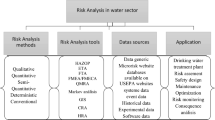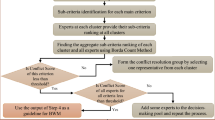Abstract
An inexact two-stage fuzzy-stochastic programming (ITFSP) method is developed for water resources management under uncertainty. Fuzzy sets theory is introduced to represent various punishment policies under different water availability conditions. As an extension of conventional two-stage stochastic programming (TSP) method, two special characteristics of the proposed approach make it unique compared with existing approaches. One is it could handle flexible penalty rates, which are much reasonable for both of the authorities and users, and have seldom been considered in the TSP framework. The other is uncertain information expressed as discrete intervals and probability distribution functions can be effectively reflected in the optimization processes and solutions. After formulating the model, a hypothetical case is employed for demonstrating its applicability under two scenarios, where the inflow is divided into four and eight intervals, respectively. The results indicate that reasonable solutions have been obtained. They provide desired allocation patterns with maximized system benefit under two feasibility levels. The solutions present as stable intervals with different risk levels in violating the water demands, and can be used for generating decision alternatives. Comparisons of the solution from the ITFSP with that from the ITSP (inexact two-stage stochastic programming) and TSP approach are also undertaken. It shows that the ITFSP could produce more system benefit than existing methods and deal with flexible penalty policies for better water management and utilization.
Similar content being viewed by others
References
Babel MS, Das Gupta A, Nayak DK (2005) A model for optimal allocation of water to competing demands. Water Resour Manag 19:693–712
Birge JR, Louveaux FV (1988) A multicut algorithm for two-stage stochastic linear programs. Eur J Oper Res 34:384–392
Edirisinghe NCP, Ziemba WT (1994) Bounds for two-stage stochastic programs with fixed resources. Math Oper Res 19:292–313
Eiger G, Shamir U (1991) Optimal operation of reservoirs by stochastic programming. Eng Optim 17:293–312
Ganji A, Khalili D, Karamouz M et al (2007) A fuzzy stochastic dynamic nash game analysis of policies for managing water allocation in a reservoir system. Water Resour Manag (in press) DOI 10.1007/s11269-006-9143-y
Huang GH (1998) A hybrid inexact-stochastic water management model. Eur J Oper Res 107:137–158
Huang GH, Loucks DP (2000) An inexact two-stage stochastic programming model for water resources management under uncertainty. Civ Eng Environ Syst 17:95–118
Huang GH, Baetz BW, Patry GG (1993) A grey fuzzy linear programming approach for waste management and planning under uncertainty. Civ Eng Syst 10:123–146
Inuiguchi M, Sakawa M (1998) Robust optimization under softness in a fuzzy linear programming problem. Int J Approx Reason 18:21–34
Loucks DP, Stedinger JR, Haith DA (1981) Water resource systems planning and analysis. Englewood Cliffs, New Jersey
Loukas A, Mylopoulos N, Vasiliades L (2007) A modeling system for the evaluation of water resources management strategies in Thessaly, Greece. Water Resour Manag (in press) DOI 10.1007/s11269-006-9120-5
Luo B, Maqsood I, Yin YY et al (2003) Adaptation to climate change through water trading under uncertainty – an inexact two-stage nonlinear programming approach. Journal of Environmental Informatics 2(2):58–68
Luo B, Maqsood I, Huang GH (2007) Planning water resources systems with interval stochastic dynamic programming. Water Resour Manag 21(6):997–1014
Maqsood I, Huang GH (2003) A two-stage interval-stochastic programming model for waste management under uncertainty. J Air Waste Manage Assoc 53:540–552
Maqsood I, Huang GH, Zeng GM (2004) An inexact two-stage mixed integer linear programming model for waste management under uncertainty. Civ Eng Environ Syst 21(3):187–206
Mujumdar PP, Nirmala B (2007) A Bayesian stochastic optimization model for a multi-reservoir hydropower system. Water Resour Manag (in press) DOI 10.1007/s11269-006-9094-3
Pereira MVF, Pinto LMVG (1991) Multi-stage stochastic optimization applied to energy planning. Math Program 52:359–375
Ruszczynski A (1993) Parallel decomposition of multistage stochastic programming problems. Math Program 58:201–228
Sen S, Higle JL (1999) An introductory tutorial on stochastic linear programming models. Interfaces 29:33–61
Wang D, Adams BJ (1986) Optimization of real-time reservoir operations with Markov decision processes. Water Resour Res 22:345–352
Wang LJ, Meng W, Guo HC (2006) An interval fuzzy multiobjective watershed management model for the Lake Qionghai Watershed, China. Water Resour Manag 20(5):701–721
Author information
Authors and Affiliations
Corresponding author
Rights and permissions
About this article
Cite this article
Lu, H.W., Huang, G.H., Zeng, G.M. et al. An Inexact Two-stage Fuzzy-stochastic Programming Model for Water Resources Management. Water Resour Manage 22, 991–1016 (2008). https://doi.org/10.1007/s11269-007-9206-8
Received:
Accepted:
Published:
Issue Date:
DOI: https://doi.org/10.1007/s11269-007-9206-8




